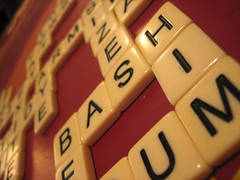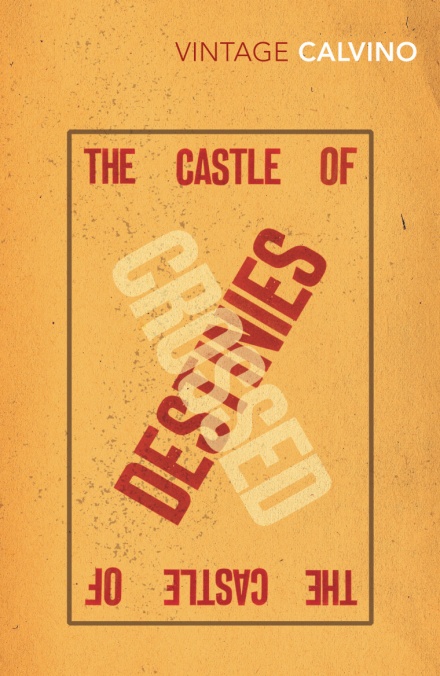So you’re hanging out with some writer-friends on a Saturday night. Perhaps you’re gathered your salon sipping absinthe, or–let’s be realistic, here–snuggled up on hand-me-down sofas drinking Yellowtail and arguing about why people don’t read short stories. (Uh, just me?)
Anyway, at some point you call a truce in the debate on whether “chick lit” is a useful term, or you call a halt to the V.S. Naipaul-bashing. How to occupy yourselves now? By playing a literary board game, of course.
In the New York Times, Dwight Gardner outlines something he calls “the paperback game“:
One player, the “picker” for this turn, selects a book from the pile and shows its cover around. Then he or she flips it over and reads aloud the often overwrought publisher-supplied copy on the back cover.
Hearing these descriptions read aloud is among the game’s distinct joys. […] One reason it’s less fun to play with serious rather than genre novels is that their back covers tend to contain phrases like “sweeping meditation on mortality and loss” rather than “a need that only he could satisfy.”
The other players absorb these words, and then write on their slips of paper what they imagine to be a credible first sentence for [the] novel. Essentially, they need to come up with something good — or bad — enough to fool the other players into thinking that this might be the book’s actual first sentence. Players initial their slips of paper and place them upside down in a pile at the center of the table.
Meanwhile the picker — the person who read the back cover aloud — writes the book’s actual first sentence on another slip of paper. He or she collects all the slips, mixing the real first sentence with the fakes, and commences to read each one aloud. Each person votes on what he or she thinks is the real first sentence.
This is a variation on one of my favorite board games, Balderdash, which I sometimes have my creative writing students play. Many people know Balderdash as “the dictionary game,” but there’s an extended version, Beyond Balderdash, that asks players to come up with a plot summary based on a movie title, explain why a particular obscure person is “famous”, outline the “important” event that happened on a particular date in history, and more. It’s great practice in making up just the right details to be convincing.
Here are some more writerly games to play:
- Scrabble, Boggle, and Bananagrams: Great ways to stretch your vocabulary and remind you of words you haven’t used in a while.
- Two Truths and a Lie: No board, paper, or props needed for this one! One person is “it” and tells the group three statements about himself or herself. As you probably guessed, two are true and one is a lie. For example, the player might say, “In high school, I streaked during a pep rally. I am incredibl afraid of ducks. And I once met Mick Jagger in a men’s room, and he peed on my shoe.” The other players can then ask “it” questions, trying to guess which statement is a lie. “It,” of course, must try to come up with convincing details for the fake story.
- The “Temporary Matter” game: This isn’t so much a “game,” but we played this once during grad school and it made for a memorable night. We did what the characters in Jhumpa Lahiri’s story do:
“I remember during power failures at my grandmother’s house, we all had to say something,” Shoba continued. He could barely see her face, but from her tone he knew her eyes were narrowed, as if trying to focus on a distant object. It was a habit of hers.
“Like what?”
“I don’t know. A little poem. A joke. A fact about the world. For some reason my relatives always wanted me to tell them the names of my friends in America. I don’t know why the information was so interesting to them. The last time I saw my aunt she asked after four girls I went to elementary school with in Tucson. I barely remember them now.” […]
“Let’s do that,” she said suddenly.
“Do what?”
“Say something to each other in the dark.”
“Like what? I don’t know any jokes.”
“No, no jokes.” She thought for a minute. “How about telling each other something we’ve never told before.”

Or, if none of these games appeal to you, check out the suggestions for literary board games at the Guardian, and make up your own.
What games do you play with your friends (writers or not)?
Further Reading:
- Prefer a controller to dice? Learn more about literary video games in our blog archives, including those based on works of literature and those inspiring works of literature.
- Read Christine Hartzer’s essay “Video Games Are Not About Monsters” and Michael Rudin’s essay “Writing the Great American
NovelVideogame” right here on FWR. - It’s not a group game, but learn how playing The Sims might help your writing.






